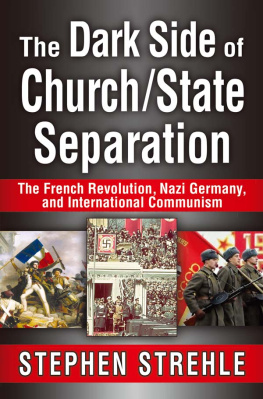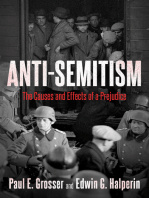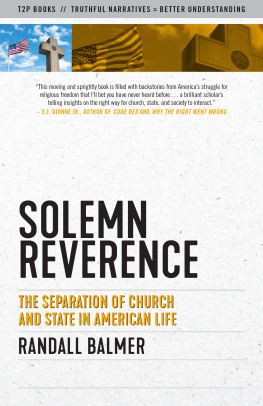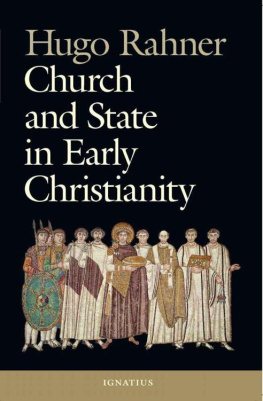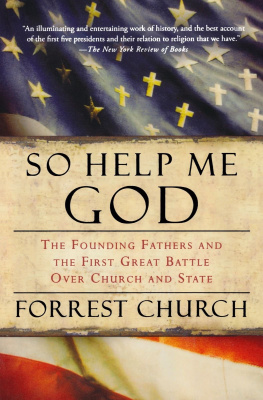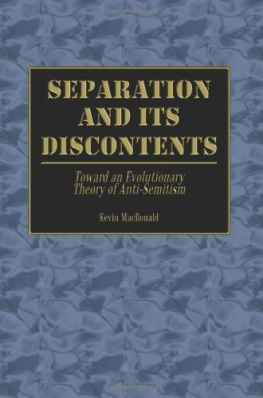First published 2014 by Transaction Publishers
Published 2017 by Routledge
2 Park Square, Milton Park, Abingdon, Oxon OX14 4RN
711 Third Avenue, New York, NY 10017, USA
Routledge is an imprint of the Taylor & Francis Group, an informa business
Copyright 2014 by Taylor & Francis.
All rights reserved. No part of this book may be reprinted or reproduced or utilised in any form or by any electronic, mechanical, or other means, now known or hereafter invented, including photocopying and recording, or in any information storage or retrieval system, without permission in writing from the publishers.
Notice:
Product or corporate names may be trademarks or registered trademarks, and are used only for identification and explanation without intent to infringe.
Library of Congress Catalog Number: 2013008855
Library of Congress Cataloging-in-Publication Data
Strehle, Stephen, 1952-
The dark side of church-state separation : the French revolution, Nazi Germany, and international Communism / Stephen Strehle.
pages cm
Includes bibliographical references and index.
ISBN 978-1-4128-5271
1. Church and state. 2. France--History--Revolution, 1789-1799--Religious aspects. 3. National socialism--Germany. 4. National socialism--Religious aspects. 5. Communism and Christianity. I. Title.
BV630.3.S77 2013
322.109--dc23
2013008855
ISBN 13: 978-1-4128-5271-5 (hbk)
Godgrant that in America true religion and civil liberty may be inseparable and that the unjust attempts to destroy the one, may in the issue tend to the support and establishment of both.
John Witherspoon, Fast Day Sermon, May 17, 1776
The concept of church/state separation developed different nuances throughout its history in Western civilization. The early church followed its own version of the concept by centering its mission upon liberating individuals from a fallen world, ignoring social problems, and planting a cosmopolitan church, which was able to thrive under different cultural conditions and governmental policies by accepting the status quo. In scripture, Jesus tells the Pharisees to unburden their lives with the concerns about the things of the world and render to Caesar the things of Caesar, leaving the problem of oppressive taxation to those who care about material possessions (Matt 22:21). He tells Pilate, My kingdom is not of this world, refusing to fight or even protest his unjust arrest and execution (John 18:36). Paul alludes to the words of Jesus in Romans 13 and develops a general policy of church/state relations out of them, telling the church to accept its role in society under the government () and not rebel against it () as if longing for another mission. One should accept the social structure of the day or whatever policy comes down from the government as a matter of indifference to the high calling of God in Christ Jesus and the separate role of the church in society (1 Cor 7:2024).
After the initial phase, the position of the early church changed from treating political concerns as a matter of indifference, deteriorating into a more rancorous polemical relationship with the empire as subordination gave way to a call for complete separation from the evils of society. Already within the scripture, one detects a darker tone in 1 John, where loyalty to the kingdom of God means forsaking the world of temptation outside the confines of the church as a realm of demonic activity.1 Love not the world, neither the things that are in the world. If anyone loves the world, the love of the Father is not in this particular person. For all that is in the world, the lust of the flesh, the lust of the eyes, and the pride of ones possessions is not of the Father but of the world (1 John 2:1516). This dark view of society expressed the fundamental attitude of the church during the first three centuries of its existence and was most consistently presented in the works of Tertullian, the third-century father of Latin theology, who called Christians to reject military and government service, Greco-Roman philosophical thought, and the many decadent amusements of the time, including the games, tragedy, and music.2 The call for separation was meant to preserve the purity of the church from worldly pleasures, but it also brought unintended consequences and produced a considerable and equally sanctimonious backlash within the society at large, as citizens of the empire accused Christians of harming the social fabric through unpatriotic behavior and paving the way for its ultimate destruction by spreading pacifism among the people.3 The emperors tried to stop the spread of the religion by implementing periodic persecutions but ultimately failed in this endeavor, eventually caving into the religion through the conversion of Constantine and witnessing the dissipation of the empires former glory through the invasion of barbarian hordes in the next century. Even when Christianity absorbed the empire and compromised the original message of the gospel with the exercise of temporal powers, it still preserved a remnant of the New Testament (NT) approach to social issues in its overall orientation, always constrained by its founding documents to exalt the spiritual over the temporal. During the Reformation, it gave birth to radical separatist groups like the Anabaptists, who called for a return to the radices (roots) of the faith and condemned involvement in society altogether, based upon the example of the NT church and the sole authority of scripture.4 Christianitys proclivity toward the NT and its doctrine of church/state separation brought considerable scorn from social critics in the modern world, who thought of the religion as little more than a form of opium, anesthetizing the people and preventing any serious attempt to resolve social problems in a culture dominated by its teachings.
Some segments of the church responded to the accusations by developing a less polemical relationship with the state, while trying to preserve the basic dichotomy between the two realms. These Christians accepted the responsibility of a dual citizenship, which sanctioned the place of spiritual and secular loyalties as separate and irreconcilable realms of service. Martin Luther expressed a form of the position at the beginning of the Reformation when he spoke of the God of the Bible possessing two hands: the left-hand exhibiting severity and justice, the right-hand showing mercy and grace to a certain few. Through this dichotomy, Luther gave expression to the genuine difficulty of reconciling the spiritual commission of the church in bringing the gospel of grace and forgiveness to the vilest of sinners with the temporal commission of the government, which must protect the citizenry and punish criminals through the strict enforcement of the law. The dichotomy between the law and the gospel created a need to recognize some sense of church/state separation, or duality between private religious practice and the public need for justice.5
The most literal followers of this position were Roger Williams and the Baptists, who sanctioned the participation of Christians in the church and government but erected a wall between the two realms, not allowing any communication between the two, or letting the left hand know what the right hand was doing.6 The position certainly recognized the difficulty of translating the Mosaic economy or the private admonitions of Jesus into a contemporary message with an obvious social application in our day and age. It showed the problematic nature of partisan political activity in the church: where left-wing Socialists transform the message of individual spiritual salvation into a social gospel of physical deliverance through the state, or right-wing conservatives, like the reconstructionists, make the laws of the Bible eternal and unchanging and readily applicable to all realms of modern society.7 It recognized the need for relative justice in a fallen world, where the believer must refrain from imposing the absolute will of God upon society and accept the possibility of depraved institutions, like slavery or divorce in certain cultures, as a necessary matter of

